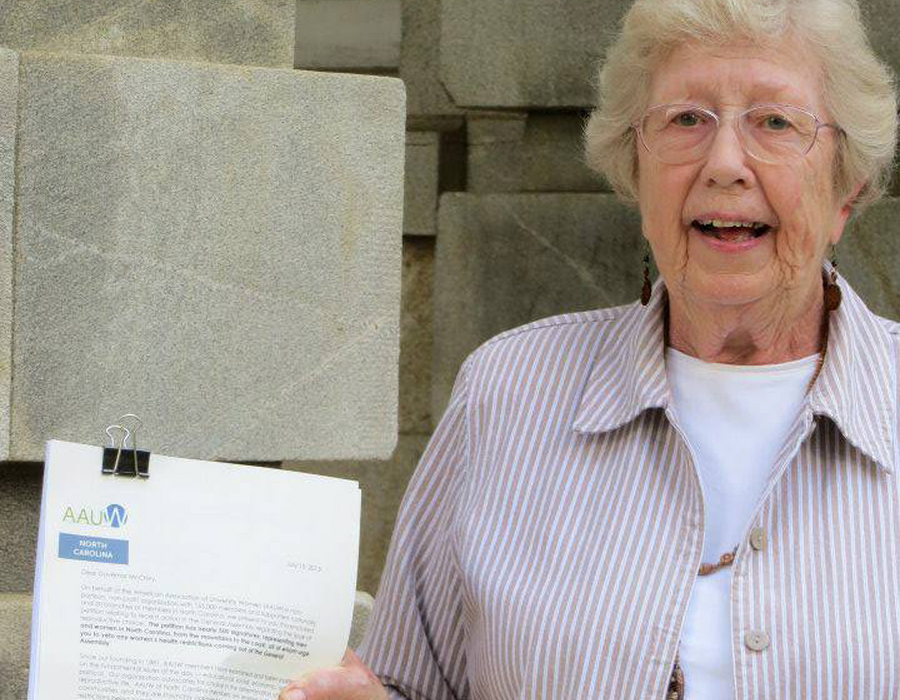Don’t forget to let us know how your petition turned out (including the delivery!) by filling out the report-back form.
How to Organize an Effective Petition Campaign

Raise Visibility
A petition is a simple yet effective tool in advocacy. With just a little bit of effort, you can generate attention and momentum around an issue, grow your list of advocates, and pressure lawmakers to act. Plus, a petition helps you raise your state’s or branch’s visibility and gain new members!
Below are best practices for collecting signatures on your petition, both online and offline. As always, you can reach out to AAUW’s public policy and government relations staff for additional help at advocacy@aauw.org.
A petition is a statement signed by a group of people calling on a specific target to take action. For example, you could collect signatures on a petition to the governor urging him or her to sign an equal pay bill. Once you’ve reached a critical mass of signatures, you’ll want to deliver the petition to the target so he or she understands how many people support the action you have proposed.
An online petition is one that can be “signed” through your website, e-mailed to others, and posted on Facebook and Twitter. AAUW public policy staff can create an online petition for you and help you distribute it via e-mail and social media. Coordinate with your state or branch public policy chair to plot a basic online strategy by using our online advocacy platform.
An offline petition is a hard copy of the petition that can be signed in-person at events (including tabling) and meetings.
Petitions are most successful when they exist online and offline so you can constantly collect signatures no matter where you are. The text of the petition is the same; the only difference is whether you are collecting the signatures on a computer (online) or on a hard copy (offline).
1. Choose a topic and target. What is the situation you want to change, and who has the power to make that change? Do you want your governor to sign or veto a bill? Do you want your U.S. representatives and senators to co-sponsor a bill? Do you want your state lawmakers to introduce legislation on a specific issue? It’s important to have a topic and a target, since your petition is most effective when you deliver it. A target could be a signature from every county, from every Congressional district, or from local organizations. Engage your members by making it a competition between local AAUW branches for the most signatures!
2. Keep the petition language short and simple. Both the signees and targets of the petition should understand what your petition seeks to achieve. Describe the problem (e.g., the gender pay gap) and the solution (e.g., state legislation to ban employers from retaliating against workers who disclose their wages). Then include the ask, or the action you want the target to take (e.g., introduce anti-retaliation legislation in your state). A well-written petition should communicate the urgency of the problem and the need for action. We recommend keeping your petition between one and three paragraphs in length.
3. Collect signatures. Every event you hold is an opportunity to collect signatures, whether it’s a tabling event, issue forum, rally, branch meeting, state convention, or coalition meeting. All you need are copies of your offline petition and pens! You’ll want to collect the names, email addresses, and zip codes of all signers. Name and e-mail address will help you follow up with petition signers afterward to keep them posting on the topic and get them more involved in AAUW. Zip code is important because elected officials want to know that the people signing the petition are indeed their constituents. Remember, AAUW public policy staff can format the offline petition for you, so all you have to do is print copies.
4. Deliver your petition! If you are delivering your petition to an elected official, drop by his or her office with a list of all the signatures you collected, both online and offline. If you want to deliver the petitions to a U.S. representative or senator when he or she is in your home district, coordinate your delivery with the House and Senate calendars to find out when they’re home for recess. Finally, a petition delivery can make a great photo op. Take pictures as you deliver the stack of petitions to the target’s office, and share them with AAUW’s national office by sending them to advocacy@aauw.org.

Here is sample petition text:
To the New Jersey congressional delegation:
We the undersigned join with the American Association of University Women (AAUW) of New Jersey in urging you to pass the federal End Sex Trafficking Act (H.R. 2805/S. 1354).
Human trafficking is a modern-day form of slavery that forces an estimated 27 million people worldwide — including people in the United States — into prostitution or involuntary labor. According to a 2007 U.S. State Department report, 80 percent of transnational victims are women and girls. The End Sex Trafficking Act would strengthen federal law to improve the arrest and prosecution of the people responsible for human trafficking.
New Jersey already leads the way with one of the nation’s strongest human trafficking laws. Now we need your support for the End Sex Trafficking Act to ensure women and girls across the country have the same level of protection.
AAUW of New Jersey
[add signatures here]
Report Back
Related
How to Organize a Candidate Forum

How to Work with the Media

How to Hold a Meeting with Your Elected Officials

